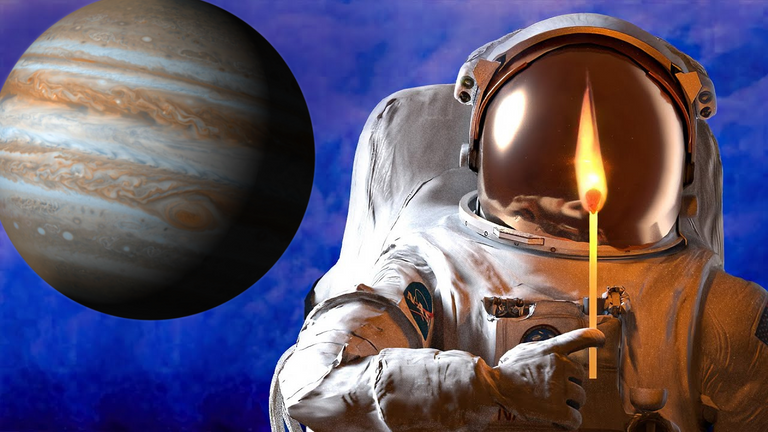
In our Solar System there are four planets that are called giants and the largest of them is Jupiter. To understand its size, imagine this! All the inner planets: Mercury, Venus, Mars and our native Earth, are only 4% of the mass of all the planets in the Solar System. Do you know how much of the total mass went to Jupiter? 71%, that is, Jupiter is many times more massive than any other object in our planetary system. But the most interesting thing is that Jupiter is a monstrously powerful thermonuclear bomb ready for use and not just a piece of stone hanging in space.

The planet belongs to the so-called gas giants. It is composed mainly of hydrogen and helium, just like our Sun, which burns due to continuous thermonuclear reactions. What if such a reaction would be triggered on Jupiter? If we were to ignite the combustible gases and dust in Jupiter's atmosphere with an ordinary match, the planet would be engulfed in universal flames and there would be an explosion?
In fact, in Jupiter's atmosphere, about 250,000 such matches, or rather meteorites, are ignited every second. They are attracted to the planet from space and burn in the atmosphere. But this does not lead to ignition, because there is no free oxygen in the gas giant and fire does not burn without oxygen.
Try to light a candle and cover it well with a glass jar, you will notice that after a few seconds it goes out, because all the oxygen simply burns. Hydrogen, which makes up almost 90% of the planet, is explosive only in the presence of oxygen. So we cannot start a thermonuclear reaction with normal phosphorus. Jupiter simply does not have the kind of fire we are used to seeing on Earth. If it could catch fire, small meteorites would have done so long ago.
But matches are not the most technologically advanced invention of mankind. We could try to start a thermonuclear reaction with something more powerful. For example, a nuclear bomb. In fact, we don't need to detonate a bomb on Jupiter to know what would happen. Over the past thirty years, the planet has experienced disasters so terrible that not even the most powerful nuclear warhead on earth could repeat them.
From 1994 to 2009, at least 2 collisions of cosmic bodies have been recorded against Jupiter, causing serious disturbances on its surface. Explosions of more than 6 million megatons were observed. This is 750 times more powerful than an explosion of all the nuclear weapons that man has managed to create, causing the appearance of large spots on the planet, the largest being 12,000 km in diameter. This is only 700 km less than the diameter of the Earth. Jupiter, however, escaped unscathed.

However, there is a but! There is a theory about exploding giant planets. It says that we humans could destroy Jupiter, Saturn, Uranus and Neptune with our bare hands. If you organized a nuclear explosion, not on the planet's surface but in its interior, you could start a thermonuclear chain reaction. With that, after the explosion of Jupiter, humanity would theoretically come to an end.
To do this you would need to send a nuclear bomb the size of the moon to its core. Then, purely hypothetically, a self-sustaining thermonuclear fusion reaction could occur. From such an explosion, the gas giant would simply explode and there would be a large-scale catastrophe for the entire Solar System.
The Jupiter explosion would be similar to a super nova explosion, but on a smaller scale. A large amount of thermal energy and radiation would be released into outer space. Solar wind currents would be disrupted and most of the planets would permanently change their orbits. The Earth as we know it would cease to exist. After the explosion, we would lose the ozone layer along with the rest of the atmosphere and inevitably die from cosmic radiation and in the sky for a long time, the consequences of the explosion would be visible to the naked eye. But, there would be no one to see the spectacle!

Only one question remains! If Jupiter has so much hydrogen, why doesn't it become a star instead of remaining a planet? This is because the mass of the gas giant is still too small for such a transformation. The hydrogen in stars is in a plasma state, i.e., it is heated to extreme temperatures due to reactions in the core. Jupiter could be a star if it were 80 times larger. Then, the temperature inside the planet would reach 10 million degrees Celsius and we would see another bright star in the sky. One thing we know for sure, in our lifetime no matter how hard we try, we will not be able to blow up Jupiter. So, don't be afraid to leave home because of a super nova explosion. It is better to wait until it gets dark, take a small telescope and look at the largest planet in the Solar System with your own eyes.

Posted Using LeoFinance Beta